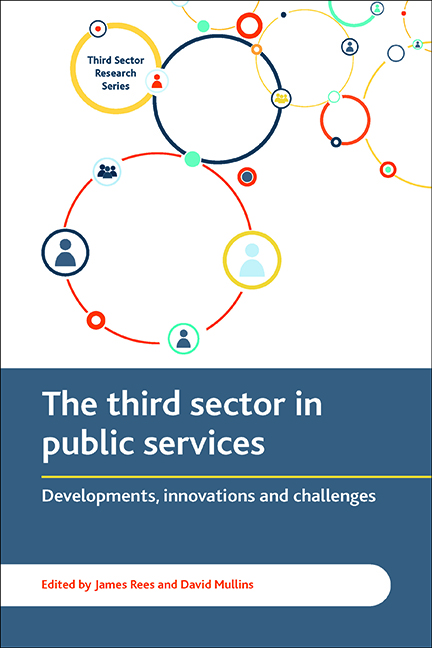Book contents
- Frontmatter
- Contents
- List of tables, figures and boxes
- Series editor’s foreword
- Notes on contributors
- one The third sector delivering public services: setting out the terrain
- Part One Policy, politics and organisations
- Part Two Cross-cutting issue for third sector service delivery
- Part Three Service delivery in key policy fields
- Index
thirteen - Conclusion
Published online by Cambridge University Press: 05 April 2022
- Frontmatter
- Contents
- List of tables, figures and boxes
- Series editor’s foreword
- Notes on contributors
- one The third sector delivering public services: setting out the terrain
- Part One Policy, politics and organisations
- Part Two Cross-cutting issue for third sector service delivery
- Part Three Service delivery in key policy fields
- Index
Summary
The third sector's involvement in public service delivery is undoubtedly a high profile and much debated aspect of the sector's overall role in society. It is one that is both very deeply rooted and long-sustained, but also one that has grown rapidly in the last 15 years. Arguably there has, until recently, been a relative dearth of empirical academic research seeking to understand the content, consequences and controversies of this engagement. This volume, in bringing together contributions from a wide range of academics who have been part of the Third Sector Research Centre, has been an attempt to address that gap in as coherent and comprehensive a manner as possible. Public service delivery remains controversial, both for many within the sector (‘looking in’) and for those equally concerned with the future of public services (‘looking out’).
As Rob Macmillan has recently put it, two narratives seem to consistently frame contemporary debates in this area. The first, a narrative of necessity and transition, suggests that TSOs need to adapt to a changing and highly challenging operating environment by becoming more professional and business-like, more efficient and impact-focused. Such calls are often associated with government (New Labour just as much as the Coalition) but also with national sector bodies. This narrative often implies a move closer to the market and to private sector modes of behaviour as a way to survive and even, perhaps, to thrive. From a more critical standpoint, there comes a narrative of jeopardy and loss, in which TSOs are drifting away from their distinctive moorings in civil society into the mainstream, adopting more hybrid characteristics in their entanglements with both the state and the private sector (Milbourne, 2013; Rochester, 2013; Benson, 2014); and such hybridisation is rarely seen as a contest in which civil society values can be reasserted (Mullins and Acheson, 2014). Both narratives seem to point to a wider truth (again, ‘looking out’) of the continued adoption of commercial approaches and a process of marketisation within public services; but with perhaps a growing preference for large private sector providers over the third sector in recent years in several sectors (employment services and criminal justice) compared to housing where large non-profits, previously the ‘preferred providers’ had been holding their own in the climate of ‘open public services’.
- Type
- Chapter
- Information
- The Third Sector Delivering Public ServicesDevelopments, Innovations and Challenges, pp. 257 - 276Publisher: Bristol University PressPrint publication year: 2016

